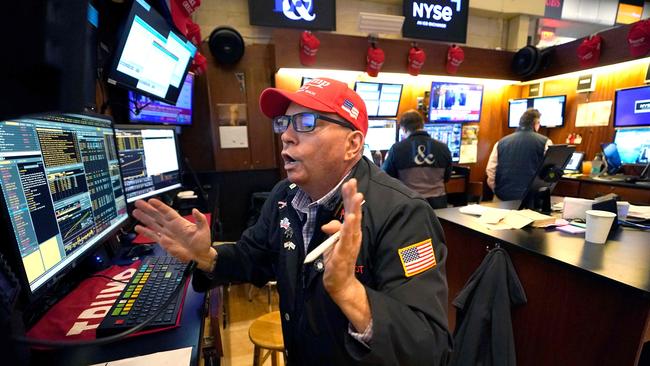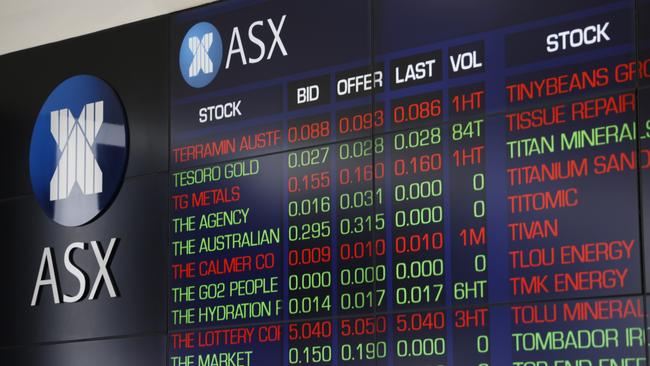Investors look for ASX winners and losers from Donald Trump’s election win
As Australian stocks struggle to keep up with a booming US market after the presidential election, investors are focusing on who benefits most from Donald Trump’s policies.

As Australian stocks struggle to keep up with a booming US market after the presidential election, investors are focusing on potential ASX winners and losers from Donald Trump’s policies.
A muted 1.1 per cent rise in Australia’s S&P/ASX 200 paled beside a 2.5 per cent jump in the S&P 500 since election day, but there may be a valuation tailwind for Australian stocks if bond yields stabilise after soaring 80 basis points to 4.44 per cent in the past seven weeks.
Crucial in that regard will be guidance from Federal Reserve officials. The Federal Open Market Committee is expected to announce a 25 basis points rate cut early Friday morning Australian time.
But investors may broadly favour ASX companies with US exposure.
They may also be wary of those with China exposures, at least before they see the shape of China’s economic stimulus plans after the National People’s Congress concludes on Friday.
“The ‘US first’ push will be a headwind for global growth and China in particular,” said Equity Trustees head of equities Chris Haynes. “Steel exports from China could potentially be impacted, which could be a negative for Australian commodities, particularly energy and iron ore – negative for BHP, Rio Tinto and Fortescue.”
Investors will also favour stocks with regulatory tailwinds over those with headwinds.
Another dividing line is stocks that benefit from high bond yields versus those that suffer.
Forty of the top 300 ASX companies get over 15 per cent of their revenue from the US, according to Macquarie Equities. Within that group, Macquarie’s Australian Strategy portfolio is overweight Block Inc, James Hardie, Light & Wonder, ResMed, Megaport, CSL, Amcor and Aristocrat.
“Notably, we see the US building and construction theme being more positive under the Trump administration,” said MLC Asset Management portfolio manager, Anthony Golowenko.
“James Hardie and Reliance Worldwide are high-quality companies within this theme.
“Similarly US manufacturing seems set to be a priority for Trump.”

BlueScope could benefit from US tariffs on China thanks to its North Star operations in Ohio.
Other US-exposed Aussie stocks that are rated outperform by Macquarie and have over 50 per cent US revenue include ProMedicus, PolyNovo, Reliance, Orora and Computershare.
Macquarie Group also has a lot of US exposure. About 31 per cent of group revenue comes from the US and its commodities and global markets division is the biggest contributor to revenue.
A big part of that comes from the US market, where Trump’s focus on conventional energy could be a tailwind. Macquarie also sees increased deal-making activity in the US, assuming a stronger domestic economy under a Trump administration.
Trump’s commitment to deregulate Biden-era rules for banks, private funds and other lenders is another positive for investment banks like Macquarie that operate in the US.
Deregulation could also help ASX-listed companies with exposure to Bitcoin, like Block.
Deregulation of US oil and gas exploration could help Worley and Woodside Energy.
But vaccine makers like CSL could face increased regulations.
A Trump administration “could be vaccine sceptical and or change the FDA”, UBS said. “Trump has made statements that Robert Kennedy Jr could have an influential role in policy making,” said UBS analyst Laura Sutcliffe. “Kennedy has previously raised questions around vaccination and questioned the FDA’s role in drug approvals.
“We expect this could raise questions over whether the current review process for drugs will remain as it is now and possibly also change the narrative around vaccines, although we note on the flip side Kennedy’s commentary (on) a willingness to raise the profile of psychedelics.”
Macquarie also sees a Trump administration as a net negative for healthcare companies operating in the US due to potential plans to replace the Affordable Care Act as it may impact Medicaid eligibility.

Macquarie analyst Christine Trinh notes that private health insurance remains the vast majority of coverage in the US population and they may be able to deny coverage for those with pre-existing conditions. Trump hasn’t provided details around a replacement for the Affordable Care Act.
“Big pharma could be under pressure as Robert Kennedy Jr to be a key member of administration and is keen to see lower prices for pharma products,” said Haynes. “Energy transition themes will be weaker if Biden’s pro clean energy IRA is repealed.”
Aristocrat and Light & Wonder are set to benefit from tax cuts under Trump.
“There is some potential offset on imported component costs, but he notes supply chains were diversified during Covid, which could mitigate this risk,” Macquarie said.
Computershare and QBE both have 40-45 per cent earnings exposure to the US, but due to accumulated tax losses only the former would likely be impacted by changes to the US tax rate.
Aside from the tax impact, both have a positive correlation to bond yields, although QBE has a higher beta and so would benefit more if a Trump win leads to higher yields. A stronger US dollar under Trump would also be a positive for Computershare and QBE, Macquarie noted.
To hedge against the risk of higher inflation, investors may want stocks that benefit from higher bond yields – including insurers and banks – though CBA is overvalued. The flip side of that is property trusts and infrastructure companies could suffer if bond yields rise.
Gold miners dived amid a surging US dollar and less demand for safe havens after the election.
However, the gold price is likely to stay high if Trump’s fiscal and trade policies cause a resurgence in inflation, and it is expected to have underlying support from central bank buying.
“Throughout what will likely continue to be volatile investment markets, we advocate for an inherent focus on quality within portfolios,” said Golowenko.
“We see inflationary pressures from key Trump policy initiatives, coupled with seemingly limited fiscal restraint and a materially larger government debt position, coming together as a ‘higher is more normal’ environment for interest rates and bond yields. Like gravity, and beyond near-term investment horizons, valuations matter and specifically we believe starting valuations to be a key determinant of investment returns.”






To join the conversation, please log in. Don't have an account? Register
Join the conversation, you are commenting as Logout